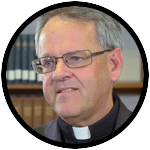
Father Thomas Dailey, O.S.F.S.
St. Francis de Sales once claimed that “knowledge is the eighth sacrament for the hierarchy of the church.”
In context, he was not seeking to alter long-standing church tradition. Instead, he was indicating the need for more and better theological education since, in his view, a significant factor in the defection of Catholics from their faith was the clergy’s uninspiring, and at time erroneous, teaching.
In the 21st century church, the need for knowledge remains paramount for priests, present and future. This month, as students head back to school, seminarians will also begin or continue their journey toward ordination. What do they need to know to bolster belief in our times?
Like anyone, they need to master the basics of how to read, write and speak.
[hotblock]
More deeply, they must learn how to think and how to know God by studying philosophy and theology.
More broadly, they should learn the ways of the world, in science and in business.
More specifically, they need to master their own tools of the trade, in the work of liturgical worship and apostolic ministry.
But in a seminary, the goal of learning is not simply education, but formation.
In addition to intellectual matters, future priests are schooled in ways human, spiritual and pastoral, enabling them to develop maturity, a life of prayer and a commitment to service. According to a recent Vatican guide on “The Gift of the Priestly Vocation,” these four dimensions of seminary education aim at “transforming” or “assimilating” the hearts of men “in the image of the heart of Christ.”
This integrated approach to priestly formation faces a steep challenge, since seminarians come to their schooling already formed, in many ways unconsciously so. Whether in nuclear, blended, or broken families, their vocation was incubated at home. Whether through popular devotions or charismatic conferences or service trips, their vocation has been nurtured in a particular experience of faith. Whether conservative or liberal, traditional or progressive, their conceptualization of “church” and “priest” is shaped by larger cultural forces at work all around them.
Of these, perhaps none holds more sway than the digital environment in and through which life takes place today. Especially for this “native” generation, technology exercises a defining influence on how they think and act, and consequently on how they believe and will minister in the church.
The Vatican’s new guide acknowledges this realm as something “from which the pastors of the future cannot remain aloof” (no. 97). “The church,” it says, “looks confidently at the possibilities offered by the digital world for evangelization” (no. 98). The document also reminds seminarians “to pay prudent attention to the inevitable risks that come with frequenting the digital world” (no. 99).
But cultivating a “sacramental” knowledge in the world of mass media and social networks demands a larger perspective than the one sketched in the guide. It calls for a more profound “thinkability of the faith in the light of the logic of the web,” according to Jesuit Father Antonio Spadaro.
In that enlightened logic, the internet is not just a place to go to during free time, or even during class (if permitted to do so). The digital world has exploded such notions of time and place. Nor is digital technology simply a powerful tool in their pastoral pocket which seminarians need to learn to use religiously. With or without their devices at hand, the reality of digital life is always “on.”
Online is where we get our information and pay our bills. There we express our thoughts, convey our hopes, and share our views in words and images. The digital realm offers a repository of data at our fingertips and a link to others near and far. Thanks to the power of apps, it also facilitates reading Scripture, praying the liturgical hours, viewing faraway liturgical ceremonies, going on a pilgrimage while staying in place and even making donations to the parish.
Like others their age, seminarians have grown up accustomed to digital technology. To be well-formed in their priestly vocation, they need to learn balance, not by turning off their use of devices, but by simultaneously appreciating the power of silence, in order to remain ever in dialogue with the One who calls them to this vocation.
Then, we hope, they will better positioned to encounter others, on- and off-line, so as to engage them even now with the joyful message of salvation that will be theirs to proclaim one day as priests.
***
Father Thomas Dailey, O.S.F.S., holds the John Cardinal Foley Chair of Homiletics and Social Communications at St. Charles Borromeo Seminary in the Archdiocese of Philadelphia.
PREVIOUS: Teens around the globe seek peace at Jerusalem summit
NEXT: Overdose takes another young life, but we persevere in prayer


Share this story